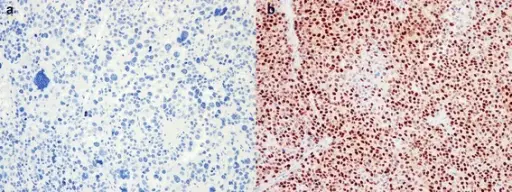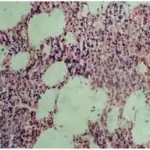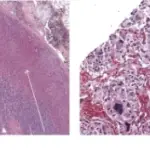Adrenocortical carcinomas are relatively rare malignancies that can have protean clinical manifestations.
What is the Pathology of Adrenocortical Carcinomas?
The pathology of adrenocortical carcinomas is:
-Etiology: The cause of adrenocortical carcinomas is tumor suppressor gene mutations.
-Genes involved: TP53, APC, TP57, TP16, H19, retinoblastoma gene, various deoxyribonucleic acid (DNA) repair ̶ enzyme genes, BCL-2, genes for StaR, SF-1 (steroidogenic factor), and Dax-1 transcription factor, P53.
-Pathogenesis: The sequence of events that lead to adrenocortical carcinomas is in situ mutations of the TP53 and TP57 genes (both antioncogenes) and increased production of insulin-like growth factor 2 (IGF-2).
-Morphology: The morphology associated with adrenocortical carcinomas shows that all adrenocortical carcinomas are monoclonal.
-Histology: The histology associated with adrenocortical carcinomas shows a weight of more than 500 g, the presence of areas of calcification or necrosis, and a grossly lobulated appearance, numerous mitoses, scant cytoplasm, and none of the rosettes observed in neuroblastoma.
How do Adrenocortical Carcinomas Present?
Patients with adrenocortical carcinomas typically are middle aged females. The symptoms, features, and clinical findings associated with adrenocortical carcinomas include virilization, Cushing syndrome, and feminization (rare) in patients with hormonally active AC. Patients with nonfunctional adrenocortical carcinomas typically present fever, weight loss, abdominal pain and tenderness, back pain, abdominal fullness, and symptoms related to metastases.
How are Adrenocortical Carcinomas Diagnosed?
Adrenocortical carcinomas are diagnosed with laboratory tests that include serum glucose, serum cortisol, serum adrenal androgen, urine adrenal hormone, urine vanillylmandelic acid (VMA), and urine homovanillic acid (HVA) levels. Imaging studies include adrenal computed tomography (CT) scanning and magnetic resonance imaging (MRI). Biopsy is confirmatory.
How are Adrenocortical Carcinomas Treated?
Adrenocortical Carcinomas is treated with total resection.
What is the Prognosis of Adrenocortical Carcinomas?
The prognosis of adrenocortical carcinomas is fair.



